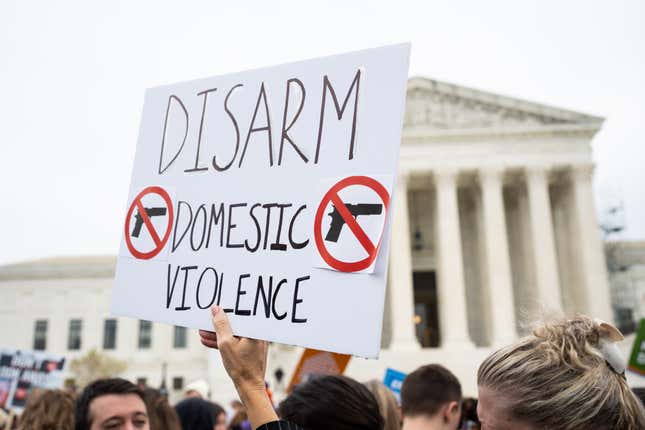Justices Alito and Thomas Unsurprisingly Argue That Domestic Abusers Have the Right to Own Guns
It seems like the Supreme Court will rule against the violent plaintiff in United States v. Rahimi, but we'll likely have to wait another seven months to see.
Politics

On Tuesday, the Supreme Court heard arguments over whether a Texas man under a domestic violence restraining order has a Second Amendment right to own guns. We’re in this hell because the court decided in June 2022 that modern gun laws are unconstitutional unless there’s a historical basis for them—meaning, would a bunch of 18th-century white guys agree with it or not?
United States v. Rahimi is one of the biggest cases of this Supreme Court term and Justices Clarence Thomas and Samuel Alito sounded very concerned that courts are stripping away a fundamental right from men who judges agree are abusive, while the other justices sounded very skeptical of the argument. But since it’s a blockbuster case, we likely won’t get a decision until late June 2024, which is when the court typically rules on the biggest appeals—regardless of when they were first argued. So we have a good seven months to worry about it.
Here’s the backstory: Zackey Rahimi’s ex-partner got a two-year restraining order against him in February 2020 after a 2019 incident in which he dragged her by her hair into his car in front of their child. When he saw that a bystander witnessed it, he pulled out a gun and fired at them. The woman escaped, but he later called her and threatened to shoot her if she told anyone about the assault. As part of the protective order, a Texas state court judge suspended Rahimi’s gun license—but not only did he contact his ex and go to her house, he also continued to keep guns. In November 2020, he was arrested after shooting at another woman and charged with aggravated assault. After three more shooting incidents, police searched his home and found multiple guns. A grand jury indicted him of violating a 1994 federal law that bans people under protective orders from owning guns; it’s punishable by up to 10 years in prison. Rahimi was initially sentenced to a little over six years in prison followed by three years of supervised release.
-

-

-

-

-

-

-

-

-

-

-

-

-

-

-

-

-

-

-

-

-

-

-

-

-

-

-

-

-

-

-

-

-

-

-

-

-

-

-

-









































